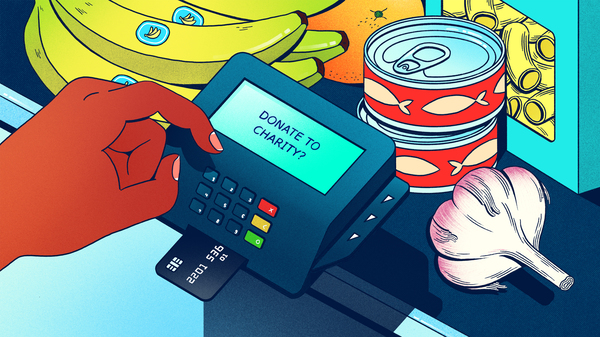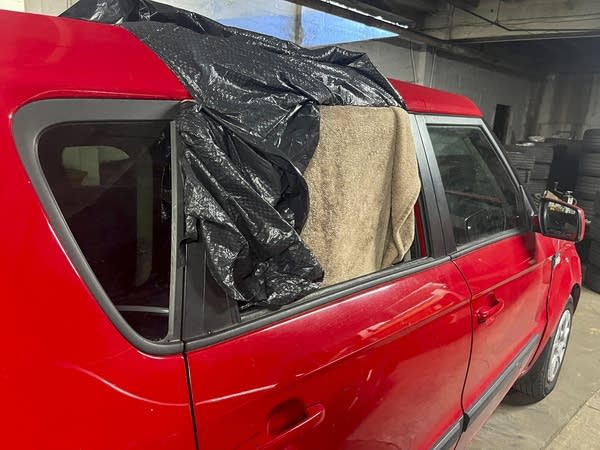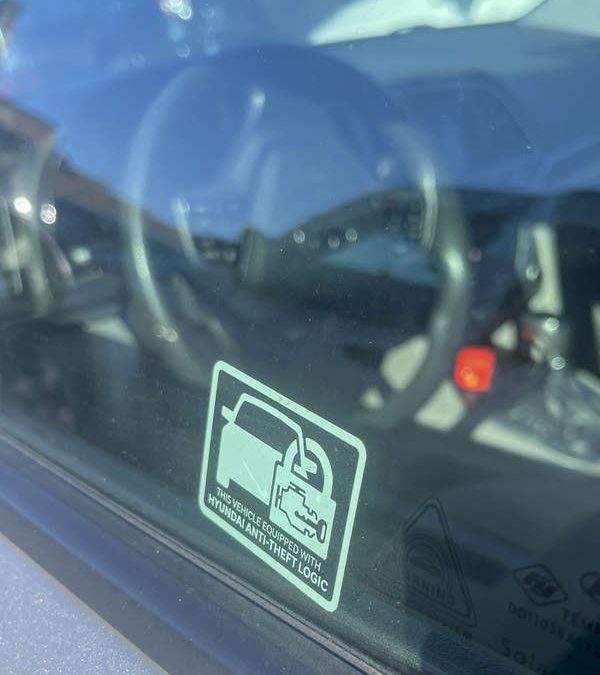
That spare change you donate at checkout is adding up to millions for charities
March 10, 2024
Retailers howled about theft last year. Why not now?
March 11, 2024Hannah Baker was told her car would be safer from theft.
Following a nationwide surge in stolen Kia and Hyundai cars built without standard security technology, the companies offered free anti-theft upgrades. About a year ago, Baker got that update.
Then, in January, she walked back to the Roosevelt High School parking lot after her teenager’s basketball game — only to find an empty spot where her 2018 Hyundai Elantra was two hours before.
"And I just stood there in shock,” she said. “We went back into the school and my 4-year-old is just hysterically crying because, 'Where's mommy's car?’ That’s when I started calling the police.”
Police recovered her car the next morning, but it was a mess. The gas tank was empty, the front was covered in mud and the steering column was gone. Her toddler’s car seat was missing, too.
Baker is not the only owner who has reported a stolen car or break-in after getting the software upgrade. While Kia and Hyundai thefts are lower than they once were at the height of the trend, owners in the state and nationwide have continued to report thefts.
The persistent issues pushed the Minneapolis City Council to unanimously pass a resolution in February, calling on the National Highway Traffic Safety Administration to initiate a national recall of certain Kia and Hyundai vehicles initially built without electronic immobilizers and anti-theft software. The Minnesota Attorney General’s Office has received hundreds of complaints from Kia and Hyundai owners over the past year. The office continues to investigate the manufacturers.
“I know people who have had their Kias stolen more than once, even after the quote unquote fix. So we’ve got a ways to go,” Attorney General Keith Ellison said. “We as prosecutors and police need to do all we can to stop auto theft. But it would be a lot better if the companies themselves made their products more secure, as just about every other auto manufacturer does.”
Certain models built between 2011 and 2022, including multiple years of Kia Souls and Hyundai Sonatas, were designed without an engine immobilizer. That's technology that stops cars from starting without a key. A hack spread on social media showed how to start the vehicles quickly and key-free. In the summer of 2021, TikTok videos of kids taking advantage of the vulnerability took off.
Representatives from both companies said in emails that for the software upgrade to work, cars must be locked. For Kias, that’s either manually or with the key fob. For Hyundai, that’s only with the key fob, according to a representative. Both companies offer free steering wheel locks, too.
Hannah Baker says she locked her car with the fob, hitting the button twice like she always does.
“I know I locked it because they came in through the door handle where the key entry is,” she said. “And if it was unlocked, why would they need to do that? They would have been able to just open the door.”
Kia and Hyundai representatives both said they are unaware of confirmed instances in which locked vehicles were stolen after the upgrade.
But that’s not what car owners are saying. Law enforcement isn’t so sure about the solution, either.
Minneapolis Police Department: ‘Absolutely, these cars need to be recalled’
As of late February, 55 percent of cars stolen in Minneapolis this year were Kias and Hyundais. That’s down from 64 percent at that point last year.
“But we remain much higher than before we had this problem,” said Minneapolis Police Chief Brian O’Hara, who added that were it not for Kia and Hyundai thefts, there would “absolutely have been a decrease” in auto theft. Instead, save for the past few months, there has been a rise.
Prior to 2021, Kia and Hyundai cars made up about 5 percent of auto theft in Minneapolis, he said. In 2022, that percentage increased to 36.5 percent. That spiked again in 2023 to 63 percent, with 4,520 Kia and Hyundai vehicles stolen in Minneapolis, according to MPD data.
It’s not just the theft that concerns O’Hara, but what follows.
Stolen Kias and Hyundais were linked to five homicides, 13 shootings, 36 robberies and 265 crashes last year, according to the Minneapolis Police Department and first reported by the Star Tribune. Oftentimes, those incidents involved children and teenagers.
O’Hara remembers attending a crime scene where a 15-year-old was shot and killed while driving around in a stolen Kia. And another crime scene where a 15-year-old crashed a stolen car during a joyride and never regained consciousness, he said.
“It’s creating opportunities for other crimes to happen and it’s putting these kids in positions where they can be seriously injured or die,” O’Hara said. "I just don't understand why everyone isn't up in arms saying, absolutely these cars need to be recalled."
In St. Paul, 46 Kia and Hyundai cars were stolen in January, down from 72 at that point in 2023, but St. Paul Police Department spokesperson Sgt. Mike Ernster said in an email there “appears to be a slowly rising trend.”
Federal regulations, lawsuits and pointed fingers
Consumer advocate Michael Brooks, executive director for the Center for Auto Safety based in Washington, D.C., said part of the problem is that not even half of all impacted cars have the software installed.
The National Highway Traffic Safety Administration, or NHTSA, says over 8 million Kia and Hyundai vehicles were built without electronic immobilizers. As of late February, each company had provided updates to about 1 million car owners, according to Hyundai and Kia representatives.
Brooks also partially blames the NHTSA for not mandating electronic immobilizers: “They played a pretty big role in the problem here by not forcing manufacturers to upgrade their vehicle security,” he said.
The federal agency, which sets and enforces Federal Motor Vehicle Safety Standards, allows vehicle manufacturers to build cars without engine immobilizers, so long as they petition and meet outlined criteria.
Previously, NHTSA has said that it had not determined the issue constituted a safety defect requiring a recall and “does not contemplate actions taken by criminal actors to break open or remove part of the steering column and take out the ignition lock to start a vehicle.”
A spokesperson said in an email that NHTSA has repeatedly met with Kia and Hyundai since 2022 to receive regular updates on the companies’ action plans and continues to monitor the issue and spread awareness of further updates to local authorities.
Last September, NHTSA issued a recall for 3.3 million Hyundai and Kia vehicles due to a fire risk. The agency urged owners of nearly two dozen models to park outside until being fixed because possible brake fluid leaks could result in fires while parked, turned off or driving.
In May 2023, Kia and Hyundai agreed to a $200 million settlement in a class action lawsuit from impacted car owners. The settlement included $300 to go toward after-market security modifications for owners of cars ineligible for the update. People have until May 3 to opt in or out to receive a benefit from the settlement.
A Kia spokesperson called lawsuits related to cars built without engine immobilizers “without merit.” The spokesperson added that the company recently developed a new hardware modification for cars ineligible for the upgrade, which reinforces the ignition cylinder body.
“Those vehicles that do not have the update installed will remain highly vulnerable to theft and a risk to public safety,” wrote Attorney General Ellison in a letter, signed by several other state attorneys general, opposing the class action settlement. “The service campaigns require consumers to proactively seek out the software update, and those who do not will continue to own a vehicle that is highly vulnerable to theft and poses a risk to public safety.”
More than just theft: ‘They just get trashed.’
Regardless of how stealable a Kia or Hyundai is, they may still attract thieves.
Mike Burns, a mechanic at Parents Autocare in Minneapolis, said he's not seeing as many stolen Kias and Hyundais as he did last summer. He does notice cars wrecked from break-ins, even if the software upgrade seems to have prevented theft. And he's currently facing a backlog on ordering Kia parts.
"They just get trashed, like not only is the window broken and the ignition is messed up, but the bumper is hanging off of it, tires are flat on it. They just wreck them,” he said. “I guess it's helpful that it's not stolen, but in terms of the inconvenience, at a minimum, it’s still the same without your car.”

Hannah Baker’s Hyundai still has issues from the January theft she has yet to address. She needs to motor between multiple jobs and shuttle her kids to sports activities, leaving not much time to go back to the shop. Already, between a break-in in 2021 and the January theft, she has tallied up to $5,700 in damages that insurance was able to mostly cover.
Baker doesn’t like her car, but she won’t give it up. It was the first new vehicle she purchased, after years of buying used.
"I was really happy to finally be able to purchase a new car. And then it was I guess a hot commodity for car thieves,” she said. “Yes, people should not steal vehicles, but they shouldn’t be this easy to steal.”





